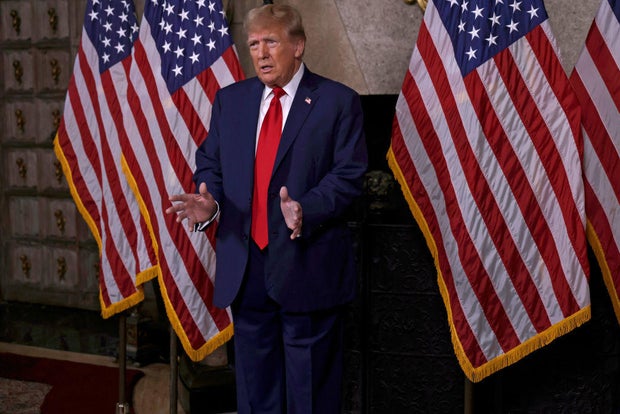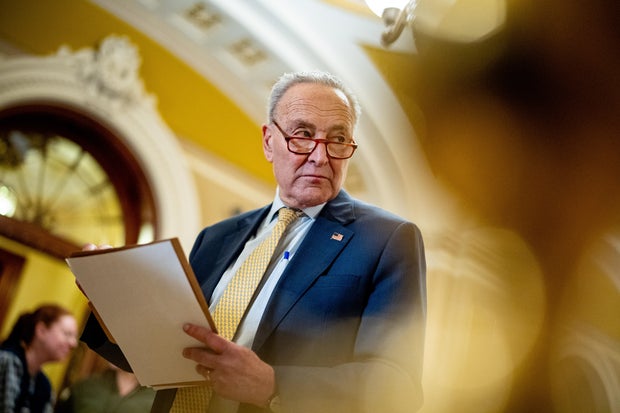CBS News
Donald Trump wins North Dakota caucuses, CBS News projects

Former President Donald Trump has won the North Dakota Republican presidential caucuses, CBS News projects.
The win comes one day after former U.S. Ambassador to the U.N. Nikki Haley secured her first victory of the 2024 presidential nomination contests, winning the Washington, D.C., Republican presidential primary.
The White House hopefuls now turn their attention to Super Tuesday, when results will pour in from 16 states in contests that amount to the single biggest delegate haul of any day in the presidential primary. Trump and President Biden, a Democrat, are dominating their races and are on track to winning their party nominations later this month.
Trump’s commanding victory in North Dakota grants him all of the state’s 29 delegates under the state’s rules.
There are 865 Republican delegates up for grabs on Tuesday. A GOP presidential nominee needs 1,215 delegates to secure the party’s nomination. Victory in North Dakota’s caucuses puts Trump at 276 delegates to Haley’s 43.
Alon Skuy / Getty Images
Four candidates were on the ballot, including Trump and Haley. The other candidates, who have received little attention, were Florida businessman David Stuckenberg and Texas businessman and pastor Ryan Binkley, who recently ended his campaign.
Retired music teacher and librarian Karen Groninger, of Almont, said Monday that she voted for Trump, calling him the best choice. The 76-year-old cited Trump’s 2020 speech at the annual March for Life anti-abortion event in Washington, D.C. —the first by a sitting president— and his border policies.
Longtime Republican state Sen. Dick Dever, of Bismarck, said he voted for Haley, but added she’s unlikely to win. The retired factory representative, 72, said, “I hear an awful lot of people say that they really liked Trump’s policies but they don’t like the way he conducts himself, and I think he’s gone overboard a bit.”
Caucus voters were encouraged to be paying party members, but those who wouldn’t pay $50 for annual membership were asked to sign a pledge to affiliate with the party, caucus Chair Robert Harms said.
North Dakota is the only state without voter registration. The caucuses followed official state voter identification protocols, such as providing a driver’s license. Voting was done only in person and on printed ballots, which will be hand-counted.
In 2016, it was a North Dakota delegate who helped Trump secure the number needed for the Republican presidential nomination. He swept North Dakota’s three electoral college votes in 2016 and 2020, winning about 63% and 65% of those votes, respectively.
As president, Trump visited Bismarck and Mandan in 2017 to talk about tax cuts, and he campaigned twice in Fargo in 2018 for Kevin Cramer in the then-congressman’s successful Senate bid against Democratic Sen. Heidi Heitkamp.
North Dakota’s Democratic-NPL Party is holding a presidential primary almost entirely by mail, with mail-in voting from Feb. 20 to March 30, and limited in-person voting for residents of Indian reservations. President Biden, Rep. Dean Phillips and six others are on the ballot.
A third party will count ballots in Fargo on March 30, with results available on the party’s website afterward.
Sen. Bernie Sanders won the Democratic caucuses in the state in 2016 and 2020.
CBS News
Senate passes $895 billion defense bill with controversial gender-affirming care restriction

Washington — The Senate approved the mammoth $895 billion National Defense Authorization Act on Wednesday, despite concern from some Democrats over a controversial policy restricting gender-affirming care for children of servicemembers.
In a 85 to 14 vote, the Senate approved the legislation, which the House passed last week. Eleven Democrats and three Republicans voted against it in the upper chamber. The bill now heads to President Biden’s desk for his signature.
The 1,800 page national security legislation to authorize funding for the Defense Department for fiscal year 2025. But the bill includes a handful of controversial policies, like the gender-affirming care restriction, and lost support from the majority of Democrats in the House.
The Democratic-controlled Senate pushed forward with the measure nonetheless. Senate Majority Leader Chuck Schumer noted that while the NDAA “isn’t perfect,” it still “includes some very good things that Democrats fought for” — citing provisions aimed at standing up against the Chinese Communist Party, boosting the use of artificial intelligence for national defense and expanding domestic tech innovation.
“Congress has passed the NDAA on a bipartisan basis for over six straight decades, and this year will be no different,” Schumer said ahead of the vote on Wednesday. “We’re passing the NDAA and that’s a very good thing.”
Andrew Harnik / Getty Images
Sen. Ed Markey, a Massachusetts Democrat, derided the gender-affirming care restriction earlier this week, calling it “the product of a nationwide campaign against trans rights” and arguing that the legislation’s approval would mark “the first anti-LGBTQ law passed by Congress in decades.”
Still, the outcome of the vote was all but guaranteed after the Senate advanced the measure on Monday in a 83-12 procedural vote.
Sen. Roger Wicker of Mississippi, the ranking Republican on the Senate Armed Services Committee, celebrated the NDAA’s “immense accomplishments,” including a 14.5% pay raise for junior service members and investments in recruitment capabilities. But he said Congress “missed an opportunity to strengthen the president-elect’s hand as he takes office in a precarious world situation.”
Wicker outlined that the Armed Services Committee proposed $25 billion for modernization programs, including for missile defense, ship building and counter-drone technology, saying “this should have been part of the bill today.”
Sen. Jack Reed, a Rhode Island Democrat who chairs the Armed Services Committee, called the legislation a “strong, forward looking bill that we can all be proud of.” But he said he “strongly” disagrees with the inclusion of the gender-affirming care provision, calling it a “misguided provision.”
“I share many of my colleagues’ frustrations that the bill includes a provision that would prohibit gender-affirming health care for minors under certain circumstances,” Reed noted, adding that he voted against the provision in committee. “We will continue to work to ensure the health care rights of all military personnel and their dependents.”
CBS News
Trump wants Herschel Walker to be U.S. ambassador to the Bahamas

Watch CBS News
Be the first to know
Get browser notifications for breaking news, live events, and exclusive reporting.
CBS News
CDC confirms first severe bird flu case in the U.S.

A person in Louisiana has the first severe illness caused by bird flu in the U.S., the Centers for Disease Control and Prevention announced Wednesday.
Officials determined the patient had exposure to sick and dead birds in backyard flocks, though an investigation into the source of the infection in the state is ongoing. This is also the first case of H5N1 bird flu in the U.S. that has been linked to exposure to a backyard flock, a news release noted. Officials have not shared details on the patient’s symptoms.
The case was first confirmed by health officials Friday, adding to the total of 61 reported human cases of H5 bird flu reported in the United States. Another severe case of H5N1 has been reported in a teen in British Columbia.
A release from the Louisiana Department of Health Wednesday added the patient, a resident of southwestern Louisiana, is currently hospitalized. Until now, the H5N1 cases in the U.S. have been mild, including conjunctivitis and upper respiratory symptoms.
“While the current public health risk for the general public is low, people who work with birds, poultry or cows, or have recreational exposure to them, are at higher risk,” the state’s health department added.
Mild illnesses have been seen in dairy and poultry workers who had close contact with infected animals. In two cases, no known source of the illnesses have been identified, which has worried infectious disease experts about the possibility of human-to-human transmission, which could trigger a pandemic.



